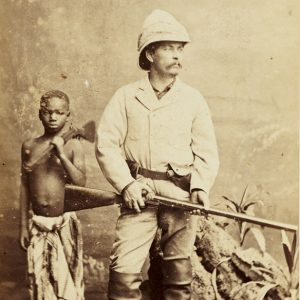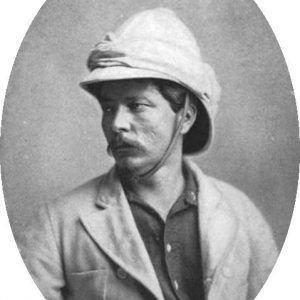calsfoundation@cals.org
Henry Morton Stanley (1841–1904)
aka: John Rowlands
Sir Henry Morton Stanley, world-renowned explorer of the Belgian Congo, specifically the Congo River, and famous for finding medical missionary Dr. David Livingstone, lived in Arkansas for a few months in 1860–1861, working as a clerk in a country store at Cypress Bend on the Arkansas River near Pine Bluff (Jefferson County).
Stanley was born on January 28, 1841, in Denbigh, Wales, as John Rowlands. He was placed in the local workhouse at an early age by his grandparents and remained there until he absconded, made his way to Liverpool, and signed on as a cabin boy on an American ship bound for New Orleans, Louisiana. When he arrived in New Orleans in February 1859, he found work on the docks. While he was working on the docks, he came to the attention of Henry Hope Stanley, a prosperous cotton broker operating out of New Orleans, who hired him as an errand boy and eventually became his mentor, tutor, and surrogate father, leading Rowlands to adopt the name Henry Morton Stanley.
In the fall of 1860, Stanley was hired by Isaac Altschul as an apprentice sales clerk at his general store at Cypress Bend a few miles south of Pine Bluff. He interacted well with the people who frequented the store. While there, he became an expert marksman, using guns and ammunition from the store. Shortly after his arrival, he became violently ill with a feverish sickness (probably malaria) that reduced his weight to ninety-five pounds.
During the spring of 1861, there was much talk of an approaching war. While he admitted that he had no strong feelings about slavery, Stanley wanted to be with his friends who wanted to enlist in the Confederate army. This was especially true after he received in the mail a packet of women’s underwear, signifying that he was too cowardly to fight. He enlisted in the Sixth Arkansas Volunteer Infantry.
During the Civil War, Stanley was captured by the Northern forces and sent to Camp Douglas in the vicinity of Chicago, Illinois. While at Camp Douglas, he was offered an opportunity to enlist in the Union army, which he accepted. Within two weeks, he became so ill that he could not function and, after being hospitalized for a time, walked away, being listed as a deserter in 1863.
In 1867, he was self-employed as a journalist covering events in the Midwestern part of the United States. His superior reporting talent came to the attention of J. G. Bennett of the New York Herald, who commissioned him to go to Africa and find Dr. David Livingstone, a medical missionary originally from Scotland who had not been heard from in more than five years and was believed dead by many. Stanley accepted the challenge and organized an expedition to search for Livingstone. On March 21, 1871, he departed Zanzibar bound for Ujiji, where Livingstone resided, arriving on November 10, 1871. When Stanley and Livingstone met face to face, Stanley offered his hand and asked the question, “Dr. Livingstone, I presume?” This phrase followed Stanley for the rest of his life. When asked why he said it, he replied, “I couldn’t think of what else to say.”
Stanley was later commissioned by King Leopold of Belgium to explore and open for development a large area along the Congo River, which became known as the Congo Free State. His last African expedition ended in Zanzibar in December 1889; the purpose of the expedition was to rescue Emin Pasha, an agent of the Egyptian government, from the Sudan, where he was cut off by hostile native forces.
Stanley married Dorothy Tennant on July 12, 1890. She persuaded him to stand for Parliament. He ran in 1892 and was defeated. He ran again, and was elected in 1895, but he became disillusioned and did not run again. In 1899, Stanley was granted the Grand Cross of the Bath by Queen Victoria.
Stanley died in London on March 10, 1904, and is buried in the village churchyard in Pirbright, Surrey, England.
For additional information:
Bierman, John. Dark Safari: The Life Behind the Legend of Henry Morton Stanley. Austin: University of Texas Press, 1990.
Hughes, Nathaniel Cheairs, Jr., ed. Sir Henry Morton Stanley: Confederate. Baton Rouge: Louisiana State University Press, 2000.
Stanley, Dorothy, ed. The Autobiography of Sir Henry Morton Stanley. Boston: Houghton Mifflin Company, 1909.
Don G. Thurman
Little Rock, Arkansas









Comments
No comments on this entry yet.